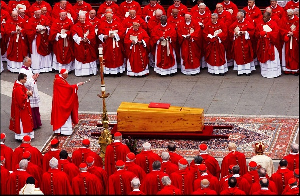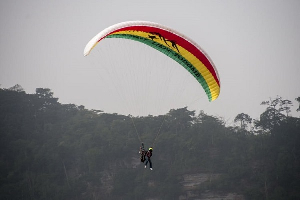By Kwame Okoampa-Ahoofe, Jr., Ph.D.
The call on the Ghana Football Association (GFA) by Mr. Vincent Sowah Odotei to support leading clubs on continental assignment would be all-too-apt for a largely lackluster national soccer administrator, were it not also for the rather quaint fact of the critic being the Chief Executive Officer (CEO) of a clearly alien and anachronistic football club called King Faisal (See “King Faisal Boss Demands GFA Support for Clubs on Continental Assignment” MyJoyOnline.com 7/19/10).
Ordinarily, one would expect a football club named King Faisal to be coming from either Saudi Arabia, where a monarch by the name of Faisal once ruled with a lineage/dynasty that still exists in that oil-rich kingdom, or one of the Bedouin-Arab countries. Thus when a premier football club located in the Ghanaian capital of Accra is formed and named King Faisal, then one begins to wonder whether both those who founded a club with such an outlandish name and the national football administrators who allowed the occurrence of such nominal anachronism have any sense of patriotism or pride and self-worth.
Indeed, if even the main reason for naming the Ghanaian-based football club after a transitioned Saudi monarch had something to do with generous financial patronage from the moneyed House of Saud, it would still not justify the act. At best what ought to have been done by the proprietors and managers of the club should have been to set up an award fund appropriately named after its benefactor for players and club administrators and other employees who demonstrate diligence and other image-enhancing achievements.
This attitudinal quirk, by the way, is nothing new to us as a people, both as individual nationalities and continental Africans, in general. In 1974, for example, having received some modicum of economic support from Saudi Arabia and, perhaps, one or two other Arab countries, Mr. Siad Barre’s Somalia modified its identity from one of a bona fide Muslim-African country into something called the “Arab Republic of Somalia.” Some 36 years on, this Horn of Africa enclave has absolutely nothing short of chaos and thoroughgoing mayhem to show for its efforts.
To be certain, it could even be aptly concluded that the beginning of the proverbial end dawned for Somalia when that African country decided, rather neurotically, to sport an alien Arab national identity instead of an organic African one. And today, sad to say, Somalia is neither a country nor even a loosely organized entity of any widely accepted Arab ethnic identity.
Some 53 years later Ghana, on the other hand, remains stuck in its neocolonial phase, with a mad and blind imitation of things Western being the prime preoccupation of its middle- and upper-classes. What with the shameless and indiscriminate sporting of Western names, to the acutely embarrassing extent of the culprits being morbidly ashamed of sporting what they routinely perceive to be an at once regressive and oppressive African identity. Thus within the remarkable span of some 22 years of Ghana’s Fourth Republic, we have been politically chaperoned by the Afropean likes of Presidents Jeremiah John Rawlings and John Evans Mills, with “John” Agyekum-Kufuor sandwiched between the former.
Ironically, Ghanaians are quick to routinely and sneeringly point to neighboring Togo as a striking example of how not to practice democracy on the African continent, with faux-elective power routinely transferred from father to son, amidst controversy and mayhem. One redeeming aspect of the Eyadema dynasty, as bizarre as the very thought may seem, of course, regards the radical cultural revolution launched by the late President Gnassingbe Eyadema a little over a generation ago, during which whirlwind process a national nominal “re-indigenization” policy decree was instituted and rigidly enforced. And believe it or not, a generation later, many an average Togolese citizen has a generally better psychological sense of balance and self-assurance than his/her Ghanaian neighbor and/or kinsman or woman.
What is also quite interesting is that Ghanaian leaders, generally speaking, appear to remarkably appreciate the need for a cultural revolution. It is at the level of application where things suddenly go awry. Thus not very long ago, for instance, we had an Irish name-toting Ghanaian academic spearheading Ghana’s Commission on Culture. Among the Akan, it is often said, facetiously, that: “If Mr./Ms. Naked promises you a bolt of cloth, you just listen to his/her name.” Of course, I know the usual riposte about a remote European ancestry. Funnily, the bulk of these European ancestors and forebears, including that of former strongman Jeremiah John Rawlings, do not seem to have amply cared about their scions well enough to have healthily and materially connected them with the mythical families on the northern hemispheric side of the Atlantic.
Still, it hardly can be gainsaid that the Ghana Football Association (GFA), in particular, and the National Sports Council (NSC), in general, could perform far more creditably than it has been doing presently. Mr. Randy Abbey, of the GFA, admits this much as follows: “We do not have a perfect system; still, what we have now is better than it was before. We are trying very hard to see how we can continue to improve on what we have right now, so that we [the GFA] can respond to current demands and expected demands in the near future” (MyJoyOnline.com 7/19/10).
Not very long ago, for instance, a leading Ghanaian sprinter bitterly complained that the NSC had virtually become a one-sport institution. We wish that we could confidently contradict the critic but we honestly cannot. Good leadership at the NSC would necessitate the constructive expansion of the definition of sports to effectively include such world-class events as cricket – which my parents intimately knew and played in the late 1940s and early 1950s – track and field events, swimming and bowling, for a handful of ready examples. And yes, it is true that organizing professional sports – even amateur ones – involves a lot of capital investment. But what is even truer is that returns reaped by efficiently operated sporting events have been known to routinely pay off in ways that, observing both their attitude and level of professional enthusiasm, one would hardly guess that many a Ghanaian sporting executive remarkably appreciates the significance of his/her job.
Democratic freedom of speech notwithstanding, it would not be totally outlandish for the National Sports Council to establish a board/committee on standard and/or acceptable club names allowable for legitimately registered sporting clubs. Ask an Egyptian or a Kuwaiti national which part of town is the J. B. Danquah, or even the Kwame Nkrumah, Sports Complex, and see whether the logical response is not apt to include the following: “What do you mean?” “What are you talking about?” “What language is that?” “Are you drunk or something?” “Wake up, buddy! And welcome to Cairo.” Or “You must be from Ghana. Do I read you correctly?”
*Kwame Okoampa-Ahoofe, Jr., Ph.D., is Associate Professor of English, Journalism and Creative Writing at Nassau Community College of the State University of New York, Garden City. He is a Governing Board Member of the Accra-based Danquah Institute (DI) and the author of 21 books, including “Ghanaian Politics Today” (Atumpan Publications/Lulu.com, 2008). E-mail: okoampaahoofe@optimum.net.
###
Opinions of Sunday, 26 September 2010
Columnist: Okoampa-Ahoofe, Kwame
GFA Needs Rules to Govern Club Names
Opinions













